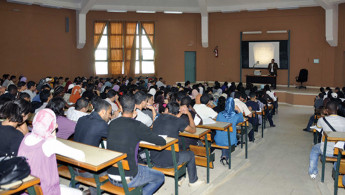Challenges facing Higher Education in Morocco
Reforming Higher Education in Morocco is now one of the main concerns of policy-makers and educators in this North African country, where 895,715 students are currently enrolled in universities - some 47,890 of them in the private sector.
A number of meetings, study days and workshops have been held to discuss the ways to put an end to the malfunctions that plague the sector. Governance is cited at the top of the challenges.
"Good governance is what the Moroccan university needs," said Said Amzazi, Morocco's education minister. "It is a principle that cannot be reached without strengthening its independence."
The modular system, adopted in 2003, which allows students to choose modules according to their desires and learning objectives, is struggling to reach its own goals.
According to a recent report published by Morocco's High Council for Education, the Higher Education system in Morocco operates at two speeds with huge differences. Contrary to selective schools, the situation is very worrying in open-access institutions - home to nearly 80 percent of students who fail to gain access to institutions with rigorous selection systems.
Public universities are suffering from a near-exponential increase in the number of students which has not been matched by the same increase in infrastructure spend, equipment, and human resources - particularly teachers.
As a result, there is an average of one university lecturer to 35 students in the faculties of science - going up to one lecturer per 173 students in the faculties of law, economics and social sciences.
 |
This situation does not help them to understand and participate, nor does it allow the professor to give his lessons in appropriate and effective conditions |  |
Speaking to The New Arab, Professor Jalal Zine El-Abidine said that overcrowding in open-access institutions remains one of the main obstacles facing the quality of teaching and learning in Moroccan universities.
Twitter Post
|
"At the pedagogical level, the professor faces many problems, for example, the nature of some subjects which are incompatible with the high number of students," said Dr Zin El Abidine. "This situation does not help them to understand and participate, nor does it allow the professor to give his lessons in appropriate and effective conditions."
The lack of teacher-researchers is another of the main problems of public universities which must be tackled by the forthcoming reform. Over the past five years, the number of university lecturers has increased by 18 percent, while student numbers have increased by 71 percent.
In the 2017 academic year, there were 13,820 university instructors teachers for 766,446 students.
"Among the challenges for Moroccan Higher Education is the problem of overcrowdedness of classes. Universities should have more and more human resources, to help overcome this problem," said Dr Souad Slaoui, a lecturer of English at Sidi Mohammed Ben Abdilah university in Fez.
This issue of teacher training and recruitment is more acute in open-access institutions which host more than 80 percent of students. In 2019, the need for teachers will be even greater, while the number of budgeted posts allocated to Higher Education has remained very limited.
In addition to hiring high school teachers with a PhD degree to teach at university level, the ministry of education intends to pursue the recruitment of PhD students by fixed-term contracts, and for the first time, to use the Moroccan diaspora, as well as foreign expertise, to plug the gaps at public universities.
 |
The reform should provide sufficient equipment for the teacher and increase the amount of training sessions for professors |  |
However, this is still a quantitative approach which will not be enough on its own, say academics. The Ministry of Higher Education is also developing a national training programme for assistant professors, in addition to adopting a system of promotion based on scientific measures of performance instead of seniority.
"The reform should provide sufficient equipment for the teacher and increase the amount of training sessions for professors in order to exchange experience with foreign professors specialised in fields that will facilitate for students the process of joining easily the job market once they graduate from the university," said Professor Slaoui.
Additionally, orientation following baccalaureate studies must improve, meaning students should apply for the majors in which they are able to best succeed.
Dr Souad Slaoui stressed the importance of testing students' abilities before accepting their applications: "The entrance to the university should be based on conducting interviews with candidates and selection only of candidates who are qualified to study."
According to its 2018 report, the National Council for Education believes that reforming Moroccan Higher Education cannot succeed with no policy to promote scientific research. To do this, it is imperative to grant financial support to the creation of research centres, specialised masters courses and doctoral schools.
Minister Saïd Amzazi also advocates the establishment of a post-doctoral system and the creation of a new type of scholarship for student researchers. Studies are underway for a new national model based on the grouping of laboratories in large centres to build a critical mass of teaching and research staff.
Today, despite its pace of scientific production, Morocco is ranked only sixth in Africa, after South Africa, Egypt, Tunisia, Nigeria and Algeria. According to Amzazi, scientific production must be significantly developed to reach at least third place; the rank that Morocco occupied before 2005.
Jalal Bounouar is a reporter from Morocco.
Follow him on Twitter: @BounouarJalal





 Follow the Middle East's top stories in English at The New Arab on Google News
Follow the Middle East's top stories in English at The New Arab on Google News


